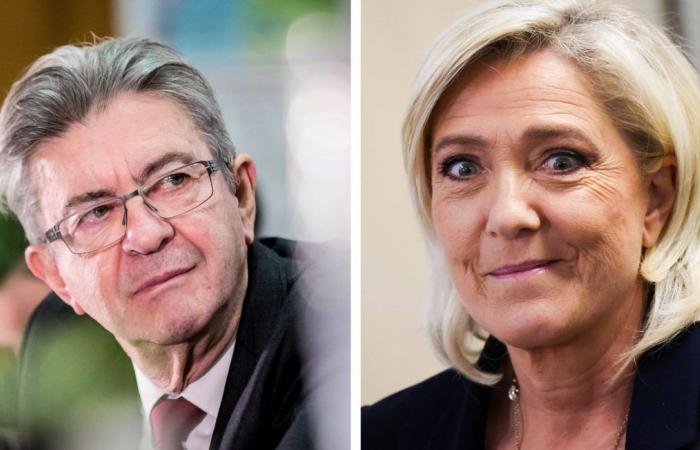Since Monday, the creation of a new Popular Front has made its opponents talk a lot, whether to invoke Léon Blum or to “accuse” this alliance of left-wing parties. Jordan Bardella of the National Rally believes he is “the only one capable of blocking Jean-Luc Mélenchon [chef de file de La France insoumise] and to the extreme left. And for François-Xavier Bellamy of the Republicans, “the greatest danger for France is the arrival in power of the extreme left of Jean-Luc Mélenchon”.
But are they right to describe LFI as a far-left party? According to the Council of State, no. In its decision of March 11, 2024, the institution ruled: La France insoumise, just like the French Communist Party, are part of the “left” bloc, as decided by the Ministry of the Interior, which attributes political nuances to the moment. elections.
So why do some people think the party is more left-wing than it is? Decryption.
“An error caused by the right-wing of the political spectrum”
“It’s something that keeps coming back,” analyzes Aurélien Dubuisson, associate researcher at the Sciences Po History Center and author of The far left in France published by Presses universitaire Blaise Pascal. In my opinion, this is an error which is caused in particular by the right-wing of the political spectrum in recent years. » The specialist notes that by taking up Mitterrand’s 1981 program, he would be seen as “the worst extremist at the moment”. “But in 1981, the political context was different, it was permeated by left-wing themes,” he emphasizes.
Before adding: “The assimilation of LFI to the far left also depends on the PS which assumed an openly liberal policy which did not really differentiate it from the right. You only need to look at the Hollande five-year term to get an idea. So, when a left-wing political movement emerges on the basis of a program which assumes its desire to break, even minimally, with neoliberalism, it can panic commentators.”
The definition of the far left
To understand why LFI is not on the far left, we must return to the definition of the term. For Aurélien Dubuisson, who cites Philippe Buton, Isabelle Sommier and Sébastien Repaire, the “alternative left” is “all the extreme left groups, Trotskyists or Maoists, to which are added all the tendencies of the libertarian movement, essentially the anarchists then the autonomous ones, as well as a whole series of political experiments resulting from May-68.” This “alternative left” is characterized by its desire to “break with the capitalist system while carrying out a more or less radical critique of the institutional left”.
Currently, Lutte Ouvrière and the New Anti-Capitalist Party are thus classified in the “extreme left” bloc. Whereas, according to the author, LFI would rather be “a reformist movement which does not aim for a clear break with capitalism but rather desires, at least initially, the adoption of measures limiting the effects of unbridled forms of economic liberalism current “.
Why is it true to say that the National Rally is far-right?
Unlike LFI, the National Rally was classified on the extreme right of the political spectrum, according to the same decision of the Council of State. Marine Le Pen’s party took the matter to court after this allocation by the ministry for the senatorial elections.
According to the definition of Jean-Etienne Dubois, in his work theFrench far right“extreme right” parties are “organizations which contest the republican and democratic political system (anti-electoralism, anti-parliamentarism, authoritarian aspirations, etc.) and/or the universal character of republican values of freedom and equality ( anti-Semitism, racism, xenophobia, etc.).”
Thus, “the origin [du Front national, devenu Rassemblement national]its core of activists and the various ideological references that exist alongside it undoubtedly inscribe the history of this party in the lineage of the French extreme right.
But do the extremes come together?
During his press conference on Wednesday, Emmanuel Macron also mentioned his main opponents for the next legislative elections and presented himself as the only alternative “to the extremes”. He thus placed the “extreme left”, which would be the new Popular Front with LFI, and the extreme right of the National Rally in the same category.
This idea that “extremes come together”, also called “the horseshoe theory”, is a “widespread formula”, notes Aurélien Dubuisson. “By presenting them as unfriendly and irresponsible, this rhetoric often aims to neutralize far-left political groups which intend to break with the dominant political and economic order,” he explains. The idea behind it is “to prevent alliances and break electoral dynamics”.
Clicking on” I accept “you accept the deposit of cookies by external services and will thus have access to the content of our partners.
More information on the Cookie management policy page
I accept
However, “almost everything differentiates the extreme left from the extreme right,” recalls the specialist. “In the current context, if LFI is targeted by this theory, it is because of the Israeli-Palestinian conflict,” he continues. Some accuse its leaders and deputies of making anti-Semitic remarks, in the same way as Jean-Marie Le Pen when he was president of the FN. We can have disagreements with LFI, particularly on the subject of Palestine, their characterization of October 7 has been the subject of debate. But calling this movement anti-Semitic is defamation. If LFI leaders and deputies made anti-Semitic comments, they would rightly be condemned by the courts. To my knowledge, none of them have. The same cannot be said on the opposite side of the political spectrum. »





